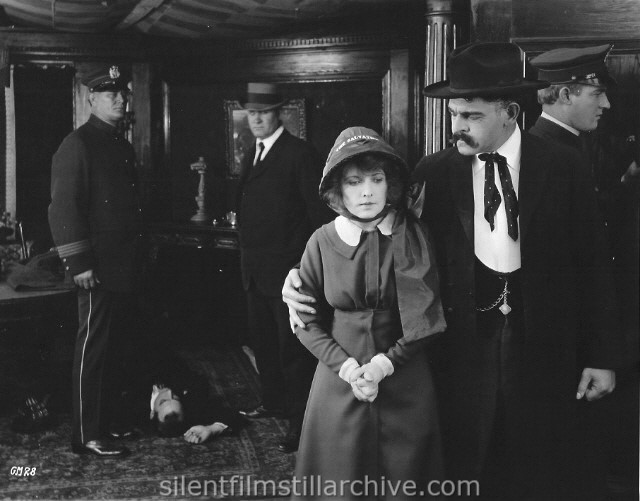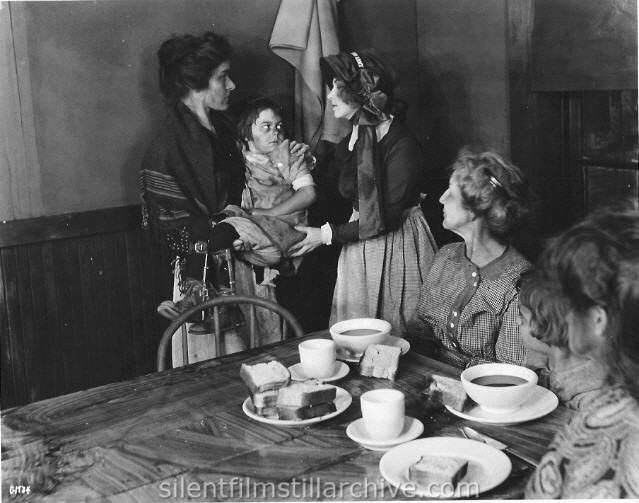![]()

A Gutter Magdalene (1916)

GM28 Charles West (on floor), Fanny Ward (Salvation Army woman), Ronald Bradbury

GM32 Fanny Ward (right)

GM24 Fanny ward (Salvation Army woman)
"A Gutter Magdalene"
Lasky-Paramount Melodrama Features Fanny Ward.
Reviewed by Thomas C. Kennedy
FANNY WARD is wholly pleasing and at times she touches a dramatic note as Maida, a country girl who has been lured to the city by an attractive crook and thereafter she is "A Gutter Magdalene".. At least the title and some of the inserts tell us so. As a matter of fact, one must take their word for it, the action fails to show her as anything but a victim of circumstances who protests continually because her not legal husband persists in being crooked.
"A Gutter Magdalene" will appeal, it's that kind of a picture. The finish of its production, the characters' sympathy-winning qualities and the manner in which they are enacted, all combine to make this offering one whose success with picturegoers there is little doubt of. Fanny Ward, besides heading the cast technically does so actually. She is attractive as the beautifully gowned victim of Jack Morgan, and also as the Maida who has become a Salvation Army lass.
The spectator is carried to some quite striking melodramatic situations. Just how these situations are brought about is another matter. Looking back on it all, we fail to recall any one situation that was brought about with any amount of logic or consistence. If one starts to ask questions as to the whys and wherefores of the actions of several characters one realizes that fundamentally the motion picture screen has told us stories greatly superior. But - and now we come to the all-important phase of the picture - interest is sustained and the story is so finely produced that the weak spots will vanish in thin air when "A Gutter Magdalene" is shown to its public.
Maida is the central character. Her husband, so to speak, brings a visitor to the city who has a number of thousands of dollars in cash about him, to their apartment for a friendly game of poker. Steve discovers, after losing heavily, that he is being cheated. He pulls a gun but he is tricked again and hit over the head with a bottle. Maida is disgusted with all this and she hurries out of the house, determined to leave Morgan. When Steve awakes he is wearing old clothes. He is arrested as a vagrant.
Maida joins the Salvation Army and while serving food at the barracks she encounters Steve, looking a bit the worse for his evenings in the parks and his old clothes. This is the beginning of a romance between the two. Morgan locates Maida and tries to force her to return. Whe he sees her with Steve he realizes that if they reach the police with their story he will be sent to jail. He decides to prevent this and does it by notifying Steve's employer, who believes his trusted assistant has stolen the money entrusted to him, and tells him just where Steve can be found. In view of the face that the employer immediately has Steve arrested, Morgan's act seems very reasonable indeed; provided you accept the theory that all criminals lack mental balance. In the end Morgan is killed, Steve's money returned and his marriage with Maida a foregone conclusion.
George H. Melford produced "A Gutter Magdalene" and he is deserving of credit. The production leaves nothing to be desired and in many cases it leaves a lasting impression. Jack Dean, Charles West, Robert Bradbury, Billy Elmer and Gertrude Kellar all give satisfactory performances.
-- Motography, June 17, 1916, p1396
A Gutter Magdalene - (Five Reels) - LASKY - JUNE 1 - Featuring Fannie Ward, who is supported by Jack Dean, Charles West, Billy Elmer, Gertrude Keller, Robert Bradbury and Jack Neill. George Milford directed the picture. A review appears elsewhere in this issue.
-- Motography, June 17, 1916, p 1411
Here is a new one. "A Gutter Magdalene." It is the chosen title of the latest Fannie Ward production from the Lasky Studio. It was made by Producer George H. Melford, who, by the way, has just bought a new car. We saw him with it, so we know, and are only waiting to see how it rides. However, this play is a good one and should make in inviting release for the bit exhibitors. Miss Ward is supported by jack Dean and a cleverly selected cast.
-- Moving Picture World, May 13, 1916, p 1153
NOTES OF THE TRADE
Fannie Ward, under the direction of George Melford, has begun work at the Lasky studio on a photoplay by Willard Mack, entitled "The Gutter Magdalene," which will be released on the Paramount Program. The famous star of "The Cheat" and "Tennessee's Pardner" will appear in this play as a Salvation Army lass who assuages the hurts and wrongs of society on the flotsam and jetsam of the Bowery.
--Moving Picture World, May 13, 1916, p 1189
"A GUTTER MAGDALENE"
(Lasky-Paramount - Five Reels)
REVIEWED BY HARVEY F. THEW
ALTHOUGH there were several incongruities, impossibilities and illogical moments in this subject, it amply fulfills what is to our mind the great mission of the motion picture - to entertain. There is a story which is not new, and atmosphere which we have encountered many times before, but the construction is both careful and artistic, and skillfully keeps the center of interest just a little in advance of the projection.
When the audience commences to murmur: "Lord, is this only the third reel?" the exhibitor might as well take the film off his machines. When the spectators say: "What, that fifth reel already!" he needs nothing more. Among the films calculated to inspire the latter attitude we have no hesitation in placing this newest Lasky subject; we believe the interest in the story will overcome the incongruities, and most of them will never be noticed.
Fannie Ward is an attractive figure. It is not the best thing she has done, nor is the role the most fortunate for her, but she is convincing and appealing. Sympathy is with her throughout.
She plays the part of a girl who has been lured from her country home by an unprincipled city man, and when she realizes her situation, she accepts it, and become the aid of a band of card sharps - the regular stuff. One day Steve Boyce, a Westerner with $40,000 belonging to a railroad, falls into their clutches. He is fleeced in a poker game, knocked unconscious with a bottle, robbed of the balance of his money and thrown into the street. There he is divested of his clothes, and when he awakes he finds himself penniless and in rags. He is promptly arrested as a vagrant.
The girl, Maida, overcome by what she has seen, flees from the house. She happens upon a detachment of the Salvation Army and joins them. After his release from the workhouse, Steve wanders into the Salvation Army barracks. He has been injured and Maida takes care of him. Meanwhile, he is being sought by the railroad as an absconder.
His "pal," Sheriff Barrett, back in Wyoming, hears of his disappearance and comes East to investigate. He falls into the clutches of the same sharper, and recognizes him as a man wanted for murder in Wyoming. He arranges to go to the man's apartment and play poker that night.
In the meantime the crook has traced the girl, and she has demanded that he restore the money to Steve, with whom she has fallen in love. He tells her to come to his apartment that night. She does so, but instead of giving her the money he attacks her. She seizes a pistol and kills him. The sheriff rushes in, grasps the situation, and when the police arrive, he takes the blame. The mystery of the lost money is explained, and Steve takes Maida back to Wyoming with him.
Jack Dean, Charles West, Billy Elmer, Gertrude Kellar, Robert Bradbury and James Neill all handle their roles acceptably. The scenario was made by the late Clinton Stagg from a story by Willard Mack.
-- Motion Picture News, June 17, 1916, page 3765-3766
with Fanny Ward, Jack Dean, Charles West. Directed by George Melford. Lasky/Paramount.
More Information on this film...

This work (A Gutter Magdalene (1916),
by
Famous Players-Lasky/Paramount), identified by
Bruce Calvert, is free of known
copyright restrictions.
Books
None.
Last Modified June 30, 2016.



















